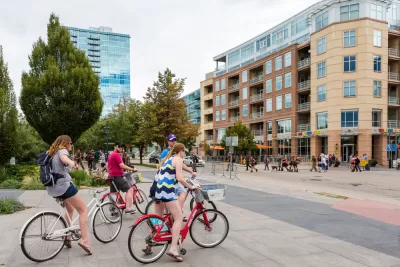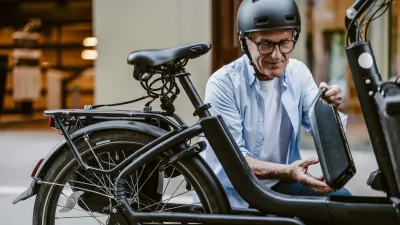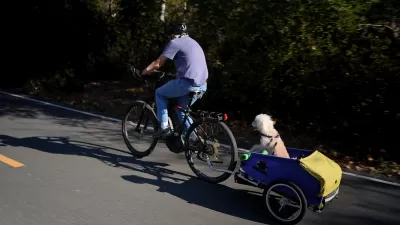Residents are taking advantage of the city’s rebate program, which offers discounts of up to $1,200 on e-bikes for low-income residents.

Writing in Westword, Conor McCormick-Cavanagh describes the success of Denver’s recent e-bike rebate program. Through the program, “Any resident could qualify for $400, and people with more limited incomes could get a $1,200 rebate. For those interested in cargo e-bikes, which have storage capacity that can handle even Costco runs, an additional $500 was available.”
The program was so popular that “By May 11, CASR had stopped accepting applications because it had already received 3,250 for a three-year program budgeted at $3 million for the first year.” But there’s hope for those who haven’t applied yet: “since fewer than 1,000 of those rebates have been paid out so far (they’re only good for two months), CASR will again accept applications starting July 11, with 2,000 available.”
According to the article, “CASR was particularly pleased with the high number of applications for the larger, income-based rebate. To qualify, applicants must show that they’re enrolled in some type of welfare assistance, like food stamps, or that they have a household income below 80 percent of the area median income.”
Colorado is a pioneer on the e-bike front, McCormick-Cavanagh writes. “In 2009, Colorado became one of the first states to define and legalize e-bikes. And then in 2017, the state further refined its classification system, which affects where e-bikes can be used.” The article features Denver residents who have purchased e-bikes using the city rebate, local bike shops who have benefited from the e-bike boom, as well as the author’s own quest to find their perfect e-bike. After the first ride, McCormick-Cavanagh writes, “I’m hooked.”
FULL STORY: Wheeling and Dealing: Denver's E-Bike Rebate Program Is on a Roll

Alabama: Trump Terminates Settlements for Black Communities Harmed By Raw Sewage
Trump deemed the landmark civil rights agreement “illegal DEI and environmental justice policy.”

Planetizen Federal Action Tracker
A weekly monitor of how Trump’s orders and actions are impacting planners and planning in America.

Why Should We Subsidize Public Transportation?
Many public transit agencies face financial stress due to rising costs, declining fare revenue, and declining subsidies. Transit advocates must provide a strong business case for increasing public transit funding.

Understanding Road Diets
An explainer from Momentum highlights the advantages of reducing vehicle lanes in favor of more bike, transit, and pedestrian infrastructure.

New California Law Regulates Warehouse Pollution
A new law tightens building and emissions regulations for large distribution warehouses to mitigate air pollution and traffic in surrounding communities.

Phoenix Announces Opening Date for Light Rail Extension
The South Central extension will connect South Phoenix to downtown and other major hubs starting on June 7.
Urban Design for Planners 1: Software Tools
This six-course series explores essential urban design concepts using open source software and equips planners with the tools they need to participate fully in the urban design process.
Planning for Universal Design
Learn the tools for implementing Universal Design in planning regulations.
Caltrans
Smith Gee Studio
Institute for Housing and Urban Development Studies (IHS)
City of Grandview
Harvard GSD Executive Education
Toledo-Lucas County Plan Commissions
Salt Lake City
NYU Wagner Graduate School of Public Service





























